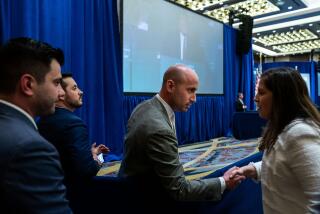Law students make appeal for change
Stanford Law School students are among the nation’s most sought-after legal graduates. Recruiters from top law firms woo them with promises of fancy offices, meaningful pro bono work and starting salaries as high as $160,000.
For Andrew Bruck and his classmates, that’s not nearly enough. They’re bent on taming the notoriously workaholic culture of their future profession.
A 24-year-old New Jersey native who graduates in May, Bruck has heard from lawyer friends about 60-hour weeks poring over mind-numbing depositions.
Young associates at many firms rarely see the inside of a courtroom and get little feedback on their performance. On top of that is the crushing pressure to make partner -- a status awarded to a small percentage of associates after years of toil that can mean stratospheric incomes but also a lifetime of weekends and evenings in the office.
So last year Bruck and about 25 other Stanford students founded Building a Better Legal Profession, which is aimed at forcing law firms to change the way they hire and promote young lawyers.
This year, the group spawned chapters at Yale and Harvard law schools as well as a Facebook following of more than 1,000 students around the country.
Those students are asking recruiters tough questions about firms’ commitment to advancing women and minorities and whether workers can hone their talents and still have time for a family.
Prodded by his and other groups, Bruck said, senior partners are taking notice.
Some law firms are building in more flexibility for young parents. Others tout programs pairing associates with mentors to help new hires. A few firms are even modifying or abandoning the sacred billable hour in favor of a compensation scheme that eases the pressure on associates, even if it means senior partners earn less.
It’s too soon to know whether these efforts will make a difference, but experts say the new focus on lawyers’ work-life balance is long overdue.
Overwhelmed and unhappy lawyers have long been the focus of hand-wringing by legal scholars as well as popular dramas such as “L.A. Law” and satiric bestsellers including Cameron Stracher’s “Double Billing: A Young Lawyer’s Tale of Greed, Sex, Lies and the Pursuit of a Swivel Chair.”
But there’s little sympathy for workaholic lawyers, said Stanford law professor Michele Landis Dauber, given the high starting salaries for new grads and annual per-partner profits of more than $1 million at some big firms.
In recent years, many rainmakers have jealously eyed the soaring compensation of their investment banker or corporate CEO clients, she said, and pushed for higher profits by increasing the ratio of associates to partners and requiring associates to work longer hours.
To keep profits growing, law firms can either “put more hamsters in the wheel or increase the number of hours the hamsters are running,” said Dauber, who advises the Stanford group.
Associates at many major firms are expected to bill 2,200 to 2,500 hours a year, she said, compared with an average of 1,700 hours in 1980. Add in work time lawyers can’t bill and many are toiling 60 to 70 hours every week, she noted.
That crushing schedule requires sacrificing everything for the chance to become partner even as the odds of achieving that goal become longer. Absent flexible schedules and hands-on guidance from firm elders, minority lawyers and young mothers increasingly drop out after a few years.
“The female hamsters are leaving the cage or getting flung from the wheel,” Dauber said.
Although women number close to half the student body at many law schools, they make up less than 25% of the partners in most large firms in Los Angeles and other major cities, according to data the Stanford students collected and posted at www.betterlegalprofession.org.
The figures for African American, Latino and Asian American partners are even lower.
“I see the women as the canary in the coal mine,” San Francisco lawyer Patricia Gillette said. “They’ve identified a problem that is now resonating with Gen Y’ers.”
Two years ago, Gillette co-founded the Opt-in Project, aimed at improving the retention of female lawyers. Working with business leaders and other lawyers around the country, Gillette has identified best practices at several corporations and pushes law firms to adopt them.
“For a while I was pretty discouraged,” she said, but firms are now beginning to experiment. Some reward associates based on the skills they’ve mastered and responsibilities they’ve taken on, rather than because they’ve survived another year in the trenches.
That scheme doesn’t penalize women who cut their hours to care for children but continue to grow as lawyers, and it pressures partners to actively mentor associates.
Kansas City, Mo.-based Blackwell Sanders ended so-called lock step evaluation of associates in 2001.
“It doesn’t make a lot of sense to compensate, bill for and advance associates based on how many years they’ve shown up for work,” partner Peter Sloan said. The firm, now called Husch Blackwell Sanders, evaluates young lawyers based on the skills they’ve acquired and gives them credit for time on pro bono cases as well as recruiting and other initiatives.
The move has cut the attrition of associates by half and has helped the firm retain female and minority lawyers, Sloan said. Clients also like this arrangement because they’re paying rates based on an associate’s experience and skills rather than just the years since graduation.
Other firms are experimenting with billing to keep both promising associates and clients who have balked at high legal fees.
Depending on the type of case, Santa Monica-based Dreier Stein Kahan Browne Woods George might bill by the hour or charge a capped rate, a contingent fee or a combination of these rates.
“I don’t want to make money off young kids who are working every night and weekend and have no social life, no community life,” partner Stanton Larry Stein said. “That person is going to burn out.”
Corporate clients with better track records promoting women and minorities also have pushed firms, said Bruck, the Stanford student.
Four years ago, Shell Oil Co. used data on diversity, billing rates, work quality and other measures to pare the number of outside law firms it hired, company spokesman Shaun Wiggins said.
Davida Brook, a first-year Stanford student and co-president of Building a Better Legal Profession, insists the group is not “anti-firm.” “It’s about helping students find the right firm for them.”
Students have “an enormous amount of market power,” the 23-year-old Los Angeles resident said. Brook, who hopes to join a large firm when she graduates, now asks recruiters what they’re doing to retain women and minorities.
Some of those questions have been met with awkward silence, she said, recalling one recruiter who touted the firm’s special “diversity week” to a student audience this year. When one student asked for details on the week’s activities, the recruiter paused, then volunteered that the firm had screened the movie “Crash,” an examination of racial tensions in Los Angeles.
“Someone described us as shooting BB pellets at a blimp,” Bruck said. The pellets may look “small and insignificant,” but they could “force a fairly big change in the way law firms work.”
--
More to Read
Sign up for Essential California
The most important California stories and recommendations in your inbox every morning.
You may occasionally receive promotional content from the Los Angeles Times.










